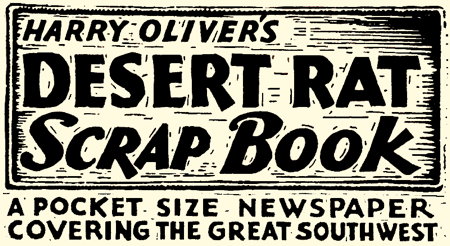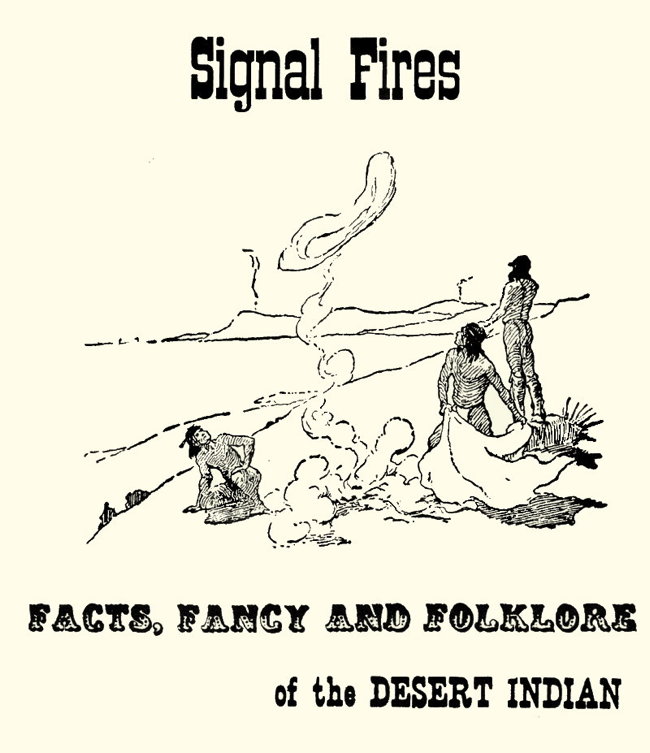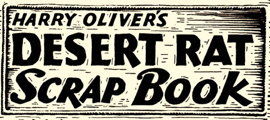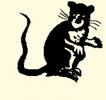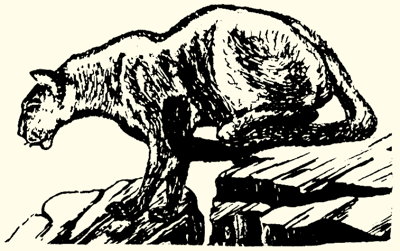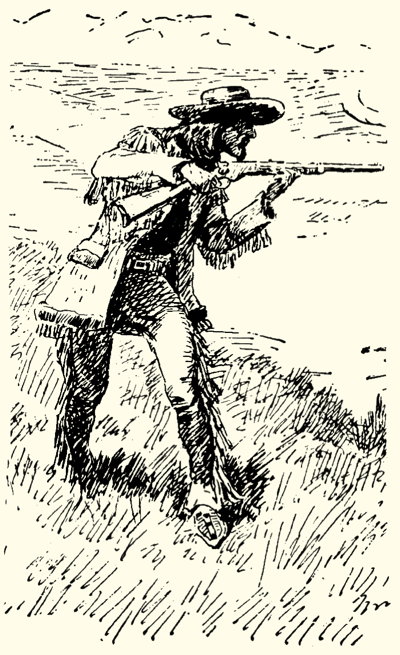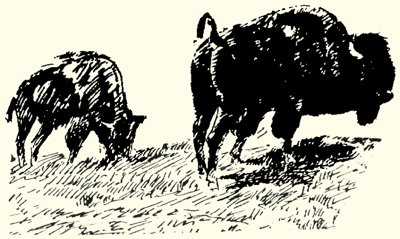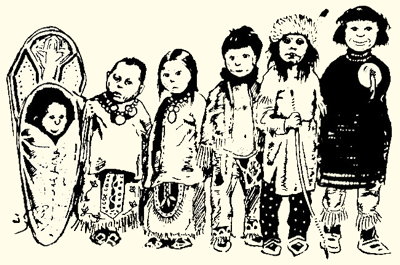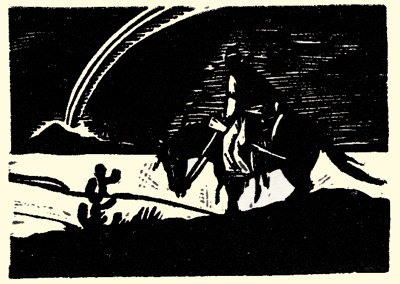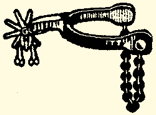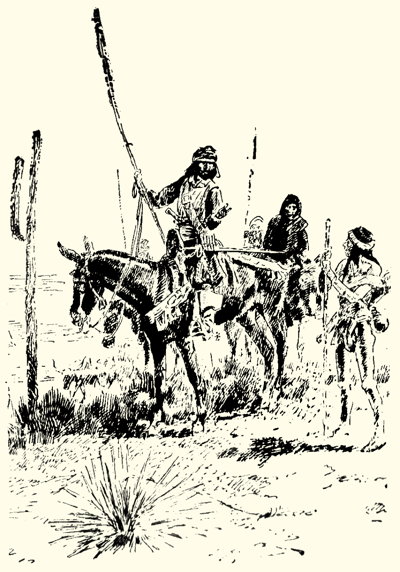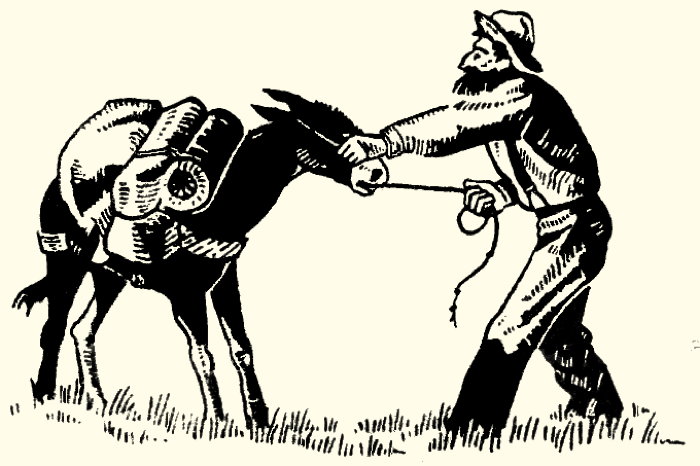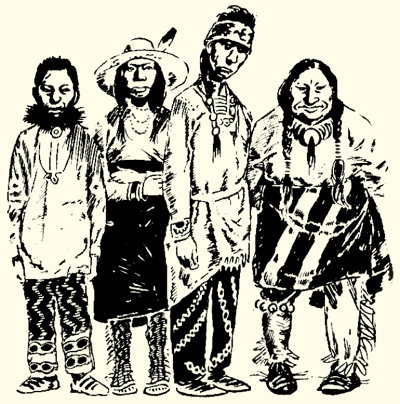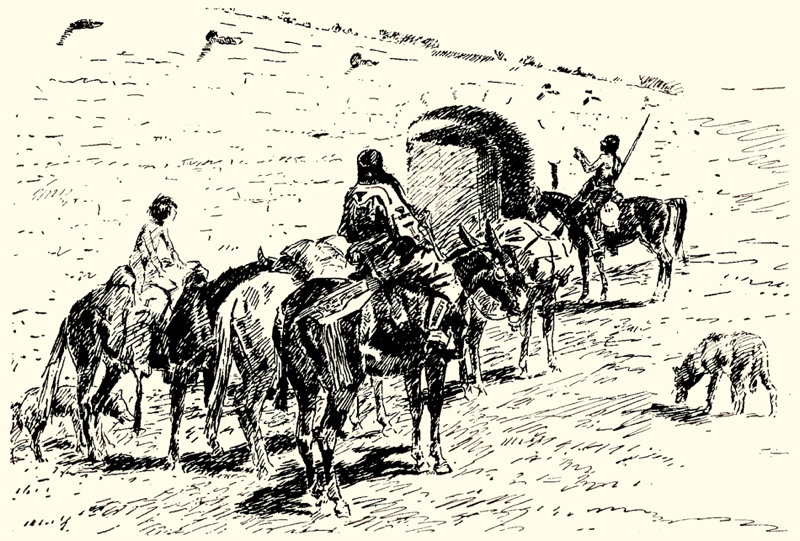BACK HOME COVER THIS IS HISTORICAL INFORMATION ONLY
PRICE 25c . . . . . ONLY ONE LOUSY COPPER QUARTER
TEEPEE TALES
PACKET ONE OF POUCH TWELVE
PUBLISHED FOUR TIMES A YEAR
ONLY NEWSPAPER IN AMERICA YOU CAN OPEN IN THE WIND
Most Of My Stuff Is Too Good To Be GruePAGE 2
Smallest newspaper in the world and the only 5 page one. (Not a Texas Boast)
Packet One of Pouch Twelve
![]()
This paper is not entered as 2nd class mail. It's a first class newspaper.
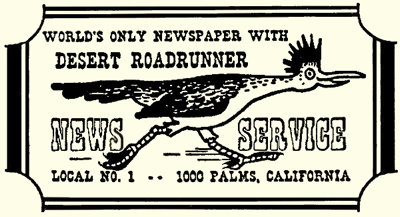
The views expressed by the Publisher are not necessarily those of the Janitor.
![]()
"Don't Sue" because you got into this paper. Should you win the suit all you would get is this "somewhat sick paper, lock-stock and barrel." (and the barrel is empty.")
![]()
Keep a green bough in your heart and the singing bird will come.
Cherokee
COUNCIL FIRE
The hardy pioneers who first put foot on the shores of this country—were seekers of land. It took guts to cross the ocean on the sailing shops of those days. Their hope was for the chance to make a new home the hard way; hewed from the forests. Adventurous huskies these: Irish, Germans, French, English, Scotch, Swedes and Dutch.
Later generations of these same pioneers kept coming West. They're now Ohioans, Kentuckyians, Virginians, and Texans—from all states they came. In the gold rush days it was said, "No coward started for California and no weakling ever got there!" They knew the ways of the West, the ways of the Indians—they got along with the Indians.
Fifty years ago, with cities built, and travel safer, cheaper, and easier, steamers from the Mediterranean brought the Armenians, the Jews, the Sicilians, the Italians, the Russians and the Poles. Many will tell you that this mixture is what makes us the greatest nation on earth—I say, it was the sprinkle of American Indian blood that got into those pioneer families as they crossed the plains through those Indian territories on moonlight nights in Indian Summer.
One reason I am so sure of this is that I am one-fourth Indian. Yes, I am now one-quarter Cherokee Indian, I used to be one-eighth Cherokee, one-eighth Irish, one-eighth Dutch, and one-half English—Here is how I made the change—I gave all my English blood to the blood bank. I told that blonde nurse to cut it off as soon as any Irish or Indian blood showed up, and she did, I am sure. Losing the English blood has helped my sense of humor, by gosh I know, and what's more I didn't multiply that Indian blood enough to lose any of my beard. "A job well done, I'd say!"
The influence of the American Indian is firmly but unconsciously stamped on most everything we do. You all speak hundreds of Indian words daily. Did you ever realize at least twenty of the states comprised in the United States bear Indian names, while for rivers, lakes and towns, the list of Indian names is almost equal proportion. By the time you have thoroughly digested this packet you will realize that the Indian's fine, simple philosophy and his humor, which is rightfully called American humor, is a great part of you too!
Reprinted from Packet three of Pouch four
![]()
For all the toll the desert takes of a man it gives compensations, deep breaths, deep sleep, and the communion of the stars.
Mary Austin
![]()
Do not use a tomahawk to remove a fly from your friend's forehead.
Indian Proverb
EDITORIAL
This is a Scrap Book . . . lots of the stories I reprint are justly credited to their writers . . . many are my very own . . . others I just claim 'Squatters Rights' to . . . as over the last twenty years I have used them many more times than their originators . . . and by feeding them penicillin, stepping-up their tempo, translating them to the Desert and throwing out nine-tenths of the words . . . they have thus become a part of this paper for all time.
An old Western saying,—goes this away . . . "DON'T USE UP ALL YOUR KINDLING TO GET THE FIRE STARTED" . . . I wish to say I can cut twenty lines down . . . to a line and a half . . . and make the fellow that wrote the original story (in twenty lines) . . . think my line and a half is where he got his idea.
BREVITY IS A REQUIREMENT IN THIS FIVE PAGE PAPER.
The farther you get into the Desert, and away from a lot of people the better these jokes and 'palaver' will seem . . . (a glass of scamper juice also helps).
![]()
This paper has revolutionized the newspaper business. I am the only Editor (not locked up) that says the next packet will be printed "when I get good and ready to print it."
That I have just about all the subscribers I want, and there will be no more notices of subscriptions run out. You worry, not me.
That I like new subscribers best because I can use my old jokes again on them.
That you that sell this paper on the newsstands and don't send in your checks pronto are dropped off my books. (Book, not books.)
That I give you fuddy-duddies a lot of typographical errors to pick at, and that all my news was news once.
That's a lot of thats, but you advertisers, the ads you pay for for a year you'll get to see in 4 printings. May take a year and a half to do it, and the stuff above (just between you and me) is just to make 'em talk about this paper.
Your Editor
The nicest thing about the future is that it comes one day at a time3
DEATH VALLEY
A solitary grave beside the road—the rough headboard with its inscription, if there ever was one, fallen or rotted or altogether gone. The same desert which overcame this lost traveler had obliterated the very sign of his lat resting place, even the place itself. A bit of rag from the victim's clothing tied to a creosote bush or mesquite may have been the impermanent, sole memorial until the desert wind carried the last shred away. Then nothing. The living soon forget.
![]()
There was Panamint Tom and his squaw. They were guiding three white people across Death Valley but got lost themselves. In this predicament they turned not to a compass, but to some corned beef, with the most devastating result. For no sooner had Panamint Tom eaten his than he remarked, "I think I die," and with these prophetic words fell off his horse, dead. The squaw, apparently unaffected by Tom's sudden demise, stolidly tramped on across the desert sands, with the white people straggling behind her. They placed their faith in her desert wisdom not in vain, for she led them to a spring. The white people whose lives she had saved took care of her as long as she lived.
Tom was buried on a mesa above Salt Creek, but that was not the end of his story. He kept "coming up." The wind took special delight in blowing the sand off his shallow grave until it became the regular, the customary, the polite, and the unexpected thing for anyone who passed that way to carry a shovel and throw a few spadefuls of sand over him again. But, of course, that couldn't go on. He was finally buried in Ballarat beside his squaw.
From "The Shadow Of The Arrow"
by Dr Margaret Long
The Caxton Printers, Ltd.
![]()
OLD TIMERS
An old timer in Sonora, California, heard a great commotion outside his cabin one night. When he went out to investigate—he found a cougar in a barrel. When the cougar stuck its tail out of the bunghole he tied a knot in the tail and wondered what he would do with such an animal. That night the cougar ran off with the barrel, and the problem was solved. The next spring when the old man was walking along a ridge, he saw the old cougar still dragging the barrel. But what made him speechless was the sight of six little cougars, each dragging a little barrel behind it.
![]()
Pete and Jim were seasoned cattlemen with adjoining ranches. Jim was at Pete's house for dinner when table talk revolved around the custom of appropriating anothers' beef at butchering time. "You know, Pete," Jim observed, "in 30 years I've neve eaten my own beef. No, sir. Never have!"
"Well," drawled Pete, "You're eatin' it now."
"Pioneers! O Pioneers!"
Owen Wiste, or perhaps it was Steward Edward White, described an early mining town approximately as: "First there was a saloon, and then there was a supply store, and then there were two saloons, and then a lawyer's office and then a feed store and then a saloon and then an undertaker and furniture store and then a saloon—I think that's right, stranger, but maybe I forgot some saloons."
Phil Strong
"Gold In Them Hills"
Doubleday & Company
![]()
Two miners, standing on the boardwalk of their booming camp, eyed with satisfaction a string of eleven mules bringing in supplies. The first ten mules packed two kegs of whiskey apiece, and the miners were high in their praise of the sensible merchant importing this necessity. They turned their attention then, with open-mouthed astonishment, to the eleventh mule, also burdened. "Now what in hell does he think we're going to do with all that flour!
Duncan Emerich
It's An Old Wild West Custom
Vanguard Press
![]()
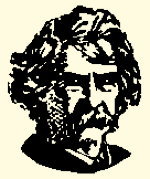 Mark Twain once gave a colorful description of the American pioneer process: "How solemn and beautiful is the thought that the earliest pioneer of civilization . . . is never the steamboat, never the railroad, never the newspapers, never the Sabbath-School, never the missionary — but always whiskey! Such is the case. Look history over and you will see. The missionary comes after the whiskey—I mean, he arrives after the whiskey has arrived. Next comes the poor immigrant with axe and hoe and rifle; next, the trader; next the miscellaneous rush; next the gambler, the desperado, the highwayman, and all their kindred in sin in both sexes; and next, the smart chap who has bought up an old grant that covers all the land; this brings in the lawyer tribe; the vigilance committee brings in the undertaker. All these interests bring the newspaper; the newspaper starts up politics and a railroad; all hands turn to and build a church and a jail—and behold civilization is established forever in the land."
Mark Twain once gave a colorful description of the American pioneer process: "How solemn and beautiful is the thought that the earliest pioneer of civilization . . . is never the steamboat, never the railroad, never the newspapers, never the Sabbath-School, never the missionary — but always whiskey! Such is the case. Look history over and you will see. The missionary comes after the whiskey—I mean, he arrives after the whiskey has arrived. Next comes the poor immigrant with axe and hoe and rifle; next, the trader; next the miscellaneous rush; next the gambler, the desperado, the highwayman, and all their kindred in sin in both sexes; and next, the smart chap who has bought up an old grant that covers all the land; this brings in the lawyer tribe; the vigilance committee brings in the undertaker. All these interests bring the newspaper; the newspaper starts up politics and a railroad; all hands turn to and build a church and a jail—and behold civilization is established forever in the land."
One day two Mohave Indians in Northern Arizona were preparing to send smoke signals to the Paiutes in Nevada. Suddenly one of those atom test bombs went off. The two Mohave Indians watched the great mushroom cloud rise, then one said, "Must be a new area code."
![]()
Matt Weinstock reports the Indians have heeded the Surgeon General's report on the harmful effects of tobacco. Now all their smoke signals are filtered.
![]()
Two cavemen were huddled close to their fire. Outside it was raining and sleeting, thundering and lightning. One of the prehistoric guys turned to the other. "You know," he grumbled, "we never had this crazy weather before they started using bows and arrows."
![]()
In Arizona an Indian sought help in filling out his income-tax forms. "How much was your income last year?" asked the Internal Revenue clerk.
"Ugh," said the Indian.
"How many dependents did you have?" the clerk tried again.
"Ugh,' replied the red man.
The interview continued, with the same answer to every question.
"Look," the clerk finally snorted. "You'll have to give me these facts. It may work out the that the government will owe you a refund."
"Ah!" exclaimed the Indian. "How much?"
![]()
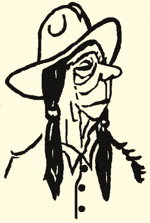
"Conscience, said an Indian, "is a three-cornered thing in my heart that stands still when I am bad, it turns around and the corners hurt a lot. If I keep on doing wrong, the corners wear off and it does not hurt any more."
![]()
Director John Ford made most of his best western films at Monument Valley, Utah, and used the local Navaho and Cheyenne tribes. His latest film, Cheyenne Autumn, is a sympathetic portrayal of the Indians. In the midst of filming, one Navaho who had made several Ford movies starring John Wayne asked Ford, "John Wayne, he not work in this movie—because we win?"
Leonard Lyons
in Reader's Digest
NUGGETS
Talk about lucky coincidences. The average adult has about 3000 square inches of skin, which is just enough to cover him.
![]()
There's no time like the present for creating a past to regret in the future.
![]()
Most people know how to say nothing—few know when.
![]()
Never let he facts stand in the way of truth.
![]()
There's only a slight difference between keeping your chin up and sticking your neck out, but it's worth knowing.
![]()
Three things cannot be taught — generosity, poetry and a sense of humor.
![]()
BENNETT CERF
Anxious to be admitted to the most exclusive club in Arizona, a tenderfoot asked what he'd have to do to qualify.
"Three things," he was told "You've got to drink a quart of straight whiskey at one sitting, you've got to hug and kiss an Indian girl for three hours without being caught by her parents, and you've got to shoot a full-sized grizzly bear.
The tenderfoot promptly downed a quart of liquor, and reeled out with a wild look in his eye. Three hours later he was back, his clothing in tatters and deep scratches on his face. "O.K., O.K," he reported. "Two out of three tasks accomplished. Now where's that Indian I'm supposed to shoot?"
![]()
Two Indians were having their first look at water skiing. Asked one, "Why boat go so fast?" Answered the other, "Lunatic on string chase em."
![]()
Chief Sitting Bull (as quoted by Dorothy Fields in Annie Get Your Gun): "I got three rules of life: no red meat, no get feet wet; no put money in show business."
![]()
An old—very old—scout swears he once heard a forceful squaw tell Sitting Bull, "Well, don't just sit there—do something!"
![]()
The Indians out West finally were convinced the white men were plumb loco when they imported a herd of camels to the deserts of Arizona and California. That was back in 1856 Harlan D. Fowler tells the story in a book published by the Stanford University Press. The camels were the bright idea of the U. S. Army, when Jeff Davis was Secretary of War, and until the railroads supplanted them, did quite a job of hauling heavy freight across barren desert stretches.
In 1864, a wily promoter in Sacramento rounded up ten of the camels and staged a race on which white men wagered thousands. The Indians knew that nothing under the sun could make a camel run when he wasn't in the mood. The animals broke from the barrier briskly enough, but, as the Indians had predicted, soon lost interest and, while the gallery jeered, stopped dead in their tracks.
The race was won by a resourceful rider who abandoned his camel and crossed the finish line in triumph astride a spavined mule.
Bennett Cerf
TEEPEE TALESHow To Be A Desert Rat And Like IT Page 4 HARRY OLIVER'S DESERT RAT SCRAP BOOK
SALTON SEA SCROLLS
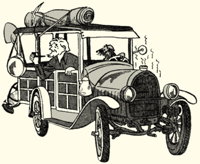 Here—for the first time—are the fascinating Salton Sea Scrolls asa best as I could decipher them from hastily scribbled notes I made just a very few feet above the Old Sea Line at Travertine Point, most picturesque rock formation in Coachella Valley.
Here—for the first time—are the fascinating Salton Sea Scrolls asa best as I could decipher them from hastily scribbled notes I made just a very few feet above the Old Sea Line at Travertine Point, most picturesque rock formation in Coachella Valley.
With my dog Whiskers driving the old 1928 Station Wagon, we pulled off Old Highway 99 to visit the most enchanted circular mile the Valley has to offer. The year was 1946. We were coming back home from an earthquake in Brawley.
The Old Station Wagon is long-gone; so is my dog. I write this in the first days of 1966 as I try once again to find the Lost Hiding Place of the Salton Sea Scrolls.
That day, 20 years ago, it was my dog that found the secret hiding place on Travertine Point. Sniffing in between the boulders, Whiskers barked a come-see bark. Looking, I saw many little paths leading under a large flat rock. With my auto-jack and shovel handle, I widened the opening and scrambled down.
I took a look around; the cornerless walls of this natural bubble in the rock showed no sign of tool marks. I sat on the floor, and there at my feet was a neat little ghostlike pile of papers—in Spanish and Latin—Indian drawings on bark, clippings, printed items, booklets. I immediately noted familiar names and places: "Father Kino, 1645-1711;" "Yuma, Captain Palma's (buxom' daughter—a great swimmer; she painted on her swim suit with red-ochre mud."
Had some hermit used this little dungeon as a place to file his notes and scrolls with skilled-up knowledge of their future historic worth? Or was this the work of pack rats?
As the bright daylight came over my shoulder, I poured over the items before me: Antonio de Fierro Blanco's story of a 50-ton ship carrying a great fortune in pearls, lost in the Salton arm of the Gulf . . . the pack rat's trail of pearls across the sands.
Peg Leg Smith, 1936. On a rumpled sheet was this note: "Peg Leg stirred up the gophers on his walk from the Colorado River to Warners Hot Springs. He punched a gopher hole with every other step.
"Fig Tree John planted fig trees at all the waterholes near the Salton Sink."
Here is a man who would have become the "Desert Johnny Appleseed" had he had—noted a Scroll postscript—a "rabbit screen to protect his little trees." (This item was written on a piece of Zane Grey Ranch stationary, P. O. Box 17, Meca; dated February 7, 1910.)
A clipping from the Indio Date Palm, 1911—a story of Dick Wick Hall (Desert humorist of Salome) who was stopping over with William Jennings Bryan for grape juice at Meca. Bill liked his grape juice sweet; Dick liked his aged.
I was wallowing in forgotten facts of Coachella Valley! There were many unsigned notes, some of one line: "The old Colorado River water was too thick to drink and not thick enough to plow" . . "Imperial County was surveyed completely from a Saloon in Yuma" . . . "The only Red Menace on our desert is sunburn."
Headline, 1906: "Teddy Wires SP: 'Stop the Colorado River from Flowing into Salton Sink.'" Despite the extra cost for a quick telegram, the job took two years. 1912—News: "Selig Studio to make motion picture of Harold Bell Wright's Best Seller—'The Winning of Barbara Worth'." 50,000 girl babies were named Barbara after the book came out.
It was getting dark; I could not read more. I climbed out. The flat rock slipped int place with a crunch. Two giant pack rats poked their heads out of the holes just above me. they were bigger than any I had ever seen, and had whiskers—or they were holding their tails in front of their faces. I may be wrong, but I would swear one thumbed his nose at me. All this took place in 1946. Every time I scrambled over the rocks, I remember that I have read many strange stories and have written a few myself, about pack rats. I think they are as close to being Leprechaunes as anything this Southwest can offer
![]()
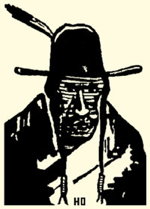
Chief Feather In the Wind has a new wigwam that is equipped with the latest in electronic appliances. You press a button and it lights the fire by rubbing two sticks together.
WEST STILL WILD
A dust-covered cowboy rode through town shouting: "Big Mike is coming! Big Mike is coming!"
Doors slammed, shades were lowered, streets were emptied.
And then a man, 6-feet-6, astride a giant horse, rode into town. He hitched his mount t a railing and stomped into the saloon, tearing the doors from their hinges as he entered.
He accosted the frightened bartender, ordered a drink mixed in a gallon bucket. The drink consisted of one quart scotch, one quart rye, one quart gin, one quart bourbon. While the fear-stricken bartender looked on, the man downed the drink in one long gulp.
"W-w-w-ould you like another one, sir?" the terrorized barkeep asked.
"Hell, no," answered the giant. I gotta get outa here. Haven't you heard, Big Mike is coming."
Pat Carrol
![]()
In Scottsale, Arizona, one starlit evening a dude was walking past a saloon when suddenly a young cowboy burst out the swinging doors, took a flying leap and landed on the seat of his pants in the street. The dude rushed to the sprawled young man and asked, "Are you hurt, sir?" "No, I ain't," the cowboy growled. "But I shore would like to find the scoundrel that moved my horse!"
![]()
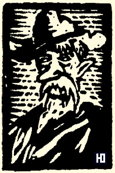
Old Rip-Snortin' tells about the dude from back east who bought a saloon in Prescott with old-fashioned swinging doors. Rip says, "He was so dumb he crawled under them for six months before he found out they swung both ways."
![]()
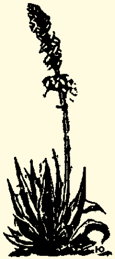
In the wild western town of Wickenburg, Arizona, a rugged cowboy swaggered into a rootin' tootin' saloon, pushed his way boldly through the crowd and demanded of the bartender, "I'm a stranger in these hyar parts Where do I plug in my electric geetar?"
![]()
Traveling on a train near Wichita Falls, Boyce House, the humorist, struck up a friendship witha hard-bitten Texas rancher. The train stopped at a little tank town, and the two went to get a bite to eat. When they boarded the train again, a "city feller" was sprawled on their seats. The rancher politely asked the interloper to move. He paid no attention.
At that the rancher pulled out his sixshooter and bounced it a few times across the man's skull. "Now I'll give you exactly four and one half seconds to get out of our seat." the rancher growled. The stranger vamoosed.
The rancher shoved his gun into his belt and said sorrowfully to House: "It's fellers like that who give Texas a bad name."
![]()
 William Barclay (Bat) Masterson — buffalo hunter, scout, frontier sheriff and card dealer, went to New York and became a reporter for the Morning Telegraph.
William Barclay (Bat) Masterson — buffalo hunter, scout, frontier sheriff and card dealer, went to New York and became a reporter for the Morning Telegraph.
He died at his newspaper desk in 1921 and on his typewriter was found this paragraph: "There are many in this old world who hold that things break about even for all of us. I have observed for example that we all get the same amount of ice. The rich get it in the summertime and the poo get it in the winter."
PAUL WILHELMS DESERT COLUMN
Maybe it's the same with you, but wherever I go in isolated desert localities—canyons and their dripping springs with Indian signs of water carved beside, or lost oases, and abandoned Malpais villages on stony mesas—the lack of the Indian's presence is always with me.
Walking the dunes where abandoned campsite spoke eloquently of these First People, I came to believe that the sorrowing landscape was woven into the Indian sense of "gone-away-from-here," making my own personal happiness touched with a kind of sadness, so that the playas and arroyos were emptier, the high blue sky higher and bluer, the barren hills more desolate, and above the thrum of the wind as it wailed through creosote another voice added—the voice of those aboriginal spirits crying for the return of the living to the land that was theirs.
It was not long before I came to believe too, through many strange experiences, that the entire desert country was haunted.
As for example the day of my discovery of an old cremation pit beyond the foothills of home. Working at excavating beads and artifacts until darkness gathered around, I suddenly trembled with an unnamed fear for the nearness of unseen beings watching me. It was not the normal fear of darkness in a strange place, nor my own hallucination, for I found my dog, half huskie and half chow, sharing my feelings and shivering under my touch as I laid a hand on its head, as much to comfort it as to calm myself.
Many others I've talked to that are acquainted with the lonely canyons and unfrequented springs admit "There's something brooding out there, something of the unknown that a man can't touch." Others have related, "Those parts of the desert that were once used by the Indians—the old trails, the mesas with their abandoned house sites—these beget fear."
I've listened to those who have "seen, felt and heard" an unexplainable something like Frank Johnson, anthropologist, who told me, "Despite the fact that I'm a scientist, the feeling that pervades Aztec Wall in the Chuckawallas at night makes the silence frightening. I can't explain it. Comparing notes, I'm not the only one who has fled from there. Maybe the ghost of an old Indian chief still prowls . . . "
![]()
Mexico
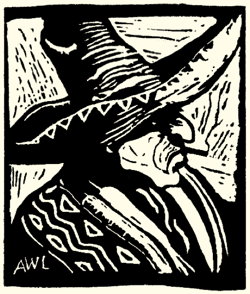 An American visiting Mexico, spotted a human skull on the shelf of a Monterrey curio shop. Fascinated, he asked the price.
An American visiting Mexico, spotted a human skull on the shelf of a Monterrey curio shop. Fascinated, he asked the price.
"One hundred pesos," replied the shopkeeper.
"Too much," said the tourist, "for just a plain, everyday ordinary skull."
"Ah, señor, perhaps. But thees ees not just an ordinary skull. Thees ees the skull of Pancho Villa!"
Well, that being the case, the skull was an absolute steal at one hundred pesos, so the Americano bought it, and on his return to the States he proudly exhibited his treasure to his friends. He assured one particular admirer of the skull that he would most certainly try to find one for him on his very next trip to Mexico.
Back in Monterrey the following summer, the American revisited the curio shop, and sure enough, there on the shelf was another skull, but somewhat smaller than the one he had previously purchased.
"How much?" he asked.
"One hundred pesos," quoted the proprietor.
"But last year when I was here, you sold me a much larger skull for one hundred pesos, and besides, it was the skull of Pancho Villa! How come you want so much for this smaller skull?""Si, señor," said the proprietor. "But thees skull ees so valuable because eet ees the skull of Pancho Villa when he was a leetle boy!"
ADULT WESTERN
He spent a fortune on bacon and beans
And patched the holes in his worn-out jeans
As he roamed the hills in search of gold
Which he never found—Bill was growing old.Then he came at last to Vegas town
His burro pooped, it's tail hung down
He saw the lights along the Strip
And his weakened brain did a double-flip.It was Christmas time, and Bill, half-dead
Had visions of Santa's loaded sled
Some beans and coffee, and maybe a stew;
If luck broke right, he might pull through.All he had was two-bits inside his poke
Old Telluride Bill was almost broke.
He'd been told of machines, the simple lout,
Where you drop two-bits and a meal comes out.Starvation does queer things, they say,
And it sure did things to Bill that day.
With his stomach set on stew or beans,
He clawed the coin from his sagging jeans.Blear-eyed from hunger, he found the slot,
And the lucky devil hit the big jack-pot!
Did Telluride cheer and whoop his deed
And head right out for a regular feed?Did he fill on food, sniff wine that's red?
He just glared around, and this he said;
"That dirty liar must think he's funny!
He said it paid food—but this stuff's money!"If I find that feller, I'll give him fits
For beatin' me out of my last two-bits."
Then he headed back for the desert rim
To look for the man wwo had lied to him.
—W. C. Tuttle
![]()
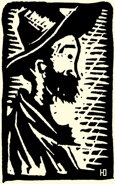
An old lady from the East visited the desert recently and expressed her astonishment at the rapid flight of time. "I do declare," she said, "I get up, have breakfast, and hardly have time to turn around before it is noon." "That's the way it is here," said Lim, "time passes very fast here. It's because of the dry atmosphere, you know."
"Lord, yes," said the lady, "I knew that one, but had forgotten it.
![]()
TUMBLEWEEDS
In the old days a traveling preacher arrived in a mining town to put on a revival. His first sermon was loaded with flame and brimstone — he described the fires of Hell in eloquent and frightening phrases. Suddenly a whiskered miner stood up in the middle of the congregation, held up his hand to stop the preacher and announced: "They couldn't be no sitch place — the people wouldn't stand fer it!"
![]()
A Texas cattle baron, charged with illicit land-grabbing, took the witness chair and protested his innocence. "It's a lie!" he shouted. "I don't want all the land in Texas—all I want is the part that jines onto my place."
![]()
Your right honourable Editor is indebted to his memory for his jests and to his imagination for his facts.
![]()
The only cannibalistic Indians known in America were the Karankawa tribe found on the Texas Gulf Coast.
![]()
A nature lover is a person who, when treed by a bear, enjoys the view.
![]()
Injun Stuff
IT'S TRUE...
The Indians in Canada get an allowance from the government for each child they have; and when the checks come in, the bucks have quite a time in the local beer parlors.
Three braves guzzled a couple of rounds of beer, then waited for the third buck to buy his round. Instead of ordering, the third buck got up and muttered, "Gotta go. I only got the kid's allowance check."
The other two Indians glowered at him as he shuffled out, then one roared out, "Dat cheap guy! He wouldn't even get dat check if it wasn't for me!"
![]()
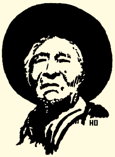 Recently I attended a meeting in Arizona of a group interested in reviving and preserving Indian culture. Among those present were a fluttery group of club women and a taciturn Apache cattleman named Joe Pima. A successful Hereford breeder, Pima sat quietly in his conservatively-cut suit while the well-meaning women talked about buckskin costumes, bead designs and dances.
Recently I attended a meeting in Arizona of a group interested in reviving and preserving Indian culture. Among those present were a fluttery group of club women and a taciturn Apache cattleman named Joe Pima. A successful Hereford breeder, Pima sat quietly in his conservatively-cut suit while the well-meaning women talked about buckskin costumes, bead designs and dances.
Finally the chairwoman called on Joe. "Mr. Pima, you haven't said anything, but I'm sure there must be some part of the old Indian culture you would like to see revived."
Pima thought for a moment, politely stood up and said, "Well, yes, ma'am, I guess there is one thing."
Delighted, the lady gushed on, "And what would that be, Mr. Pima?"
"Scalping," said Joe.
Ed Ogle
Calgary, Canada
![]()
![]()
While serving with the Royal Canadian Mounted Police in the Calgary district more than 20 years ago, I did a great deal of work with the Sarcee Indians. When I was leaving the area, one old chief whom I had arrested a number of times for drunkenness presented me with a fancy beaded hatband. I wore it proudly and showed it to many people. Recently I ran into an old friend who was able to translate the Indian characters on the hatband for me: "THE BIG BLUE-EYED LONG-NOSED S.O.B."
W. J. Bummitt
TRUE The Man's Magazine
![]()
In Scottsdale, Ariz., a Mormon church planned a western-style barbecue as a fund-raising benefit. To attract a sizable crowd from around the countryside, they hit upon the idea of using Indian smoke signals. But to their surprise, they couldn't find an Indian who knew how to send smoke signals. "We never use them," said an Apache. "We've forgotten how," said a Hopi.
The chairman of the Colorado River Tribes admitted that he had once made a smoke signal when he worked for the movies. "But if I were to send up a smoke signal today," he said, "it would have to be one big white puff and two dark puffs—the Indian Bureau requires two carbons of everything."
Don Dedera in Phoenix Arizona Republic
![]()
PRAIRIE FEATHERS
There have been three great fighting nations among the North American Indians. The Sioux with their allies the Cheyennes, the Apaches and the Yaquis of Mexico.
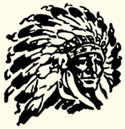 The Sioux made a great theatrical show of warfare. They galloped into battle wearing gorgeous warbonnets of feathers; their ponies decorated on the shoulders with scarlet and blue patches of paint; pony tails wrapped with scarlet cloth. The warriors 'made up' for war paint like chorus girls. Their battles were distinguished by dash an speed. They went into action with their ponies hitting the turf as fast as their little hoofs could pound. These battles were not so much a mater of killing the enemy as of doing stunts. To win honors in battle, the warrior tried to touch a foe with his hand or to whip him in the face with his heavy quirt without killing him—at least before he killed him. If a warrior could do this or take a way a weapon from a living foe, he was awarded what was called a 'coup stick' which was a badge of high honor and geve him the right to wear certain feathers in his hair. With them it was a matter of glory and honor and daring.
The Sioux made a great theatrical show of warfare. They galloped into battle wearing gorgeous warbonnets of feathers; their ponies decorated on the shoulders with scarlet and blue patches of paint; pony tails wrapped with scarlet cloth. The warriors 'made up' for war paint like chorus girls. Their battles were distinguished by dash an speed. They went into action with their ponies hitting the turf as fast as their little hoofs could pound. These battles were not so much a mater of killing the enemy as of doing stunts. To win honors in battle, the warrior tried to touch a foe with his hand or to whip him in the face with his heavy quirt without killing him—at least before he killed him. If a warrior could do this or take a way a weapon from a living foe, he was awarded what was called a 'coup stick' which was a badge of high honor and geve him the right to wear certain feathers in his hair. With them it was a matter of glory and honor and daring.
The Apache, on the other hand, was a killer, pure and simple. The Apaches taught their boys that a warrior should be like a coyote: a sudden shot and a naked figure slipping out of sight behind the rocks. It was a matter of great shame to an Apache if one of the foe ever saw him during a battle. His shots came out of nowhere.
During our twenty years against the Apaches, our soldiers seldom saw one, but there was not a minute that the Apaches did not see the soldiers. A signal smoke curling up in black spirals against the sky, a spit of flame, and a soldier falls dying to the desert. Nothing to be seen but the heat waves rising from the silent rocks. That was Apache warfare. They didn't dress up like the Sioux. If the Apache had human vanity, it did not take the form of feathers and make-up. Like Kipling's Gunga Din, a bit of twisty rag was all the equipment he could find. A rag tied around his head and a breechclout with a pair of moccasins was the Apache war uniform.
The Yaqui had still a different method of making war. Unlike the Sioux, he has usually been a foot soldier. He marches into battle to the beat of a Yaqui tom-tom: a little drum with rawhide head. The pom-pom, pom-pom of this little drum freezes your blood: it seems so deadly and relentless. I have heard the Yaquis marching to the attack to the beat of this drum; and I don't want to hear it again.
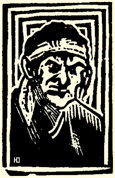 As nearly as I can read the Yaqui's heart, he likes to fight in the same way an American likes baseball. They seem to enjoy being shot at. In one of the recent Mexican revolutions, a large company of Yaquis were mobilized. They started on one side, and flopped over to the other when the general changed his mind. It was all right with them. They didn't care on which side they fought.
As nearly as I can read the Yaqui's heart, he likes to fight in the same way an American likes baseball. They seem to enjoy being shot at. In one of the recent Mexican revolutions, a large company of Yaquis were mobilized. They started on one side, and flopped over to the other when the general changed his mind. It was all right with them. They didn't care on which side they fought.
One day I saw my little friend Pablo, the Yaqui, in the trenches at Naco. He was by this time on the Federal side, but he opened his coat and showed me that he was carrying the red badge of the rebels.
'Hey, Pablo,' I remonstrated, 'you are on the other side now.'
Pablo smiled a funny smile and shrugged his shoulders. 'Well, one never knows,' he said.
When the revolution came unexpectedly to an end, Pablo and his Yaqui friends were outraged. They refused to go home. They said they had been invited to fight and they wanted to fight somebody. They felt as though they had been invited to a party and sent home before the refreshments came.
From OLD MOTHER MEXICO
By Harry Carr
Houghton Miffling Company 1931
![]()
On maneuvers at Camp Young during World War II, General Patton's troops were attempting to put into practice their lessons in camouflage. One driver after exerting considerable energy and ingenuity in disguising his tank, looked with dismay on it's shadow, steadily growing larger as the sun passed its zenith.
An officer pointed at the shadow and yelled, "What are you going to do about that?"
"I don't know, sir." meekly answered the driver.
"Well, don't just stand there!" shouted the officer. "Throw some sand over it."
Council Fires5
The Navajo Indian domesticated the Wild Turkey.
•
The Indian population in the desert is steadily growing—from 8,000 to 45,000 in 60 years.
•
The Seri Indians of Tiburon Island, in the Gulf of California, can run down horses, coyotes, deers, and even jackrabbits, on foot, it is claimed.
•
Over 3,000 different herbs and plants for therapeutic use were grown in Montezuma's Mexican botanical gardens years before the discovery of America.
•
Indians prefer black hats, because they acquired the habit of wearing black hats when the Union Army gave them extra hats after the war between the states.
•
The Mohave Indian says, "The white man's forehead is wrinkled because he is always aking, 'Will tomorrow be bad?' He never has time to smile because it is very good right now.
•
The stone for the Indian sacred Redstone pipe is only found in Pipestone County, Minnesota - and nowhere else. Archeologists find that the Indians had traded this precios stone with Indians everywhere in the Unites States.
•
Keep the brightest trail. —Indian Advice.
•
The oldest inhabited home in America is a mud house in Santa Fe, New Mexico—It wa old before the Spanish came in the 16th century.
•
The American Indian has never had a substitute for liquor: most all primitive races in other parts of the world have.
•
If you're pickin' up this paper for the first time — where've you been?
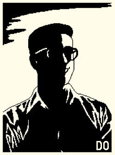
All text was hand-entered (no OCR scans) by Dick Oakes who did the layout, markup and graphics reproduction. The contents remain the property of Bill Lincoln and his heirs.
